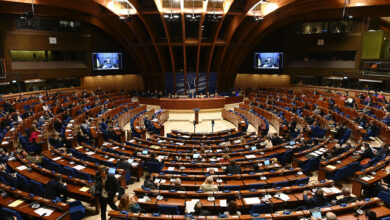An international report focusing on the plight of pro-democracy and human rights activists and associations that are working under tough political circumstances or are being persecuted by their host countries–especially in the Middle East–was officially released in Cairo on Sunday.
Representatives from The Observatory for the Protection of Human Rights Defenders discussed the findings of their 526-page report, entitled “Steadfast in Protest,” in light of the situation in the region.
Participants included prominent Egyptian human rights lawyer Hafez Abu Saeda, who told Al-Masry Al-Youm that he had been personally assisted by such organizations when he himself was being persecuted.
“I’m one of the first victims of oppression here whose case was taken up by such organizations back in 1998. That’s why I believe there’s a need for such groups that specialize in reporting and documenting violations against those who fight for human rights,” Abu Saeda said at the conference in response to a question from Al-Masry Al-Youm. “This report, for instance, doesn’t track human rights violations in general, but looks at what happens to bloggers, writers, media people, civil society groups and others that fight for people’s rights and for freedom of expression.”
Mercedes Rogriguez of the World Organization against Torture, agreed. She told the audience that such reports differentiated from local reports in the sense that they “try to give the ability to [human rights] defenders because they’re the ones that can bring change to their countries.”
“We need this kind of independent assessment, because how else can we do it?” she said, explaining that rights violators were either not signatories to the international human rights convention, or, like Egypt, were signatories that refused to allow special inspection procedures by the United Nations.
The report examines eight North African and Middle Eastern countries, including Egypt, citing numerous violations of local activists’ political and human rights.
“Why were these eight countries selected? Because we had no choice,” program representative Alexandra Poneon told participants. “In some countries, the situation is such that you don’t have access to the data, so you can’t document it. In some countries, exposure puts defenders in more danger, as in Saudi Arabia for instance.”
The report states that several countries in the region have refused to cooperate with existing UN mechanisms for the safeguarding of human rights. Such states have, for example, refused entry to special human rights rapporteurs dispatched for the purpose of monitoring and documentation. This includes Egypt, which has barred rapporteurs on torture and other cruel, inhuman or degrading treatment, along with rapporteurs on extrajudicial, summary or arbitrary executions, among others.
Egypt, as well as other countries on the list of “oppressors,” also sets restrictive legislation, according to the report, that impedes freedom of association, such as the refusal to grant permits to associations actively defending human rights. “In 2009, the human rights situation in Egypt was still very worrying,” reads the report, going on to attribute Egypt’s poor record to the presence of a repressive, three-decades-old emergency law.
Among the more disturbing repercussions of the emergency law, according to the report, is that it permits “the Minister of Interior to give orders for administrative detention, a ruling that can be renewed for an unspecified period without charge or trial … [it] also permits the President of the Republic to refer cases implicating civilians to a military court.”
In another section, the report notes that “recourse to torture in Egypt remained frequent, in spite of the campaigns led by Egyptian civil society to denounce this practice.”
It goes on to cite the legal obstacles to freedom of association–especially in relation to NGOs concerned with human rights–as well as to freedom of assembly and freedom of movement, in addition to harassment faced by journalists, as the main hindrances to the practice of human rights advocacy in Egypt.
But Egypt is not the worse case, according to Poneon, who said that the worst offenders in terms of human rights were those states that “combine all forms of suppression against local human rights defenders, like Syria or Tunisia. These defenders are only able to work on their own cases, so it’s very difficult for them to do activities there.”




